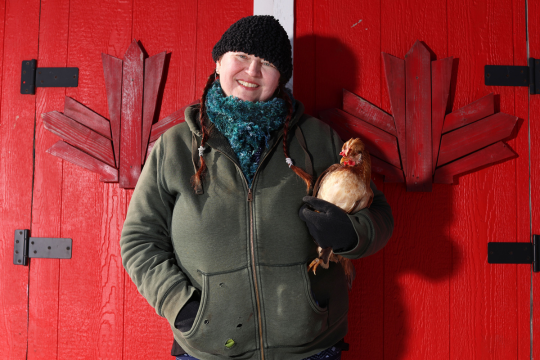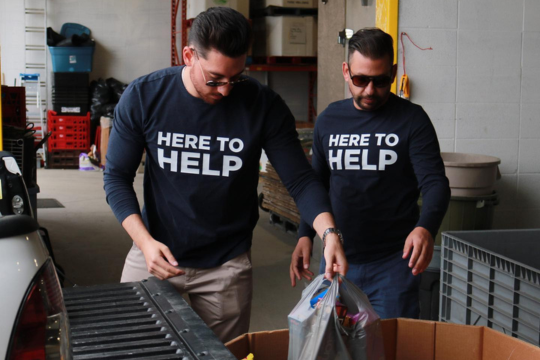
Elaine Waddington Lamont, co-founder and mental health director at Women Warriors Healing Garden, says women are an important and underserved minority of the veteran community. She’s holding Caramel the hen, who is part of the garden’s animal-assisted therapy program. Photo: Dave Chan
Lynn Kennedy is a passionate advocate for women veterans. Kennedy, who is president of the Women Warriors Healing Garden’s (WWHG) board of directors, says women experience the military differently: “You’re a part of the team, but not part of the team. You never forget you’re a woman.”
And women veterans are underserved in the current system.
“Women make up about 16 per cent of the veteran community. It is an important, but underserved, minority,” says Elaine Waddington Lamont, WWHG’s mental health director and co-founder. “We have tried to centre their needs, without forgetting the larger context of the veteran community.”
While women make up a small percentage of the total number of veterans in Canada, they are the community’s fastest-growing cohort. Women are more likely than men to release medically from the military, either for physical or mental health reasons, including post-traumatic stress disorder (PTSD).
Dr. Erin Kinsey, a disabled U.S. veteran and Canadian citizen, is one of the founders of WWHG. She discovered garden therapy in the United States as a way to work through PTSD, and created the garden in 2015, after permanently relocating to Ottawa. The garden offers a variety of therapeutic programs, including peer support, community gardening and animal-assisted therapy, at no cost to current and former members of the Canadian Armed Forces.
Kennedy says most women veterans experience different trauma than men do, often at men’s hands, which makes many of them uncomfortable attending shared support groups.
However, Waddington Lamont adds, if they know someone who is accessing a support service in their retirement, they are more inclined to try out that service themselves.
“I often hear that someone has heard about us through a friend, and I think that is still the way that many women and 2SLGBTQ+ community members trust the most,” Waddington Lamont says.
“What I find sad is that a lot of them blame the [military] organization for the help they didn’t get, which makes them bitter about the organization,” Kennedy says. “Women soldiers are still soldiers.”
Many service providers and veterans say that maintaining a sense of camaraderie and purpose goes a long way toward safeguarding veterans’ mental health in retirement.
“One of the biggest challenges our clients face is social isolation, and the mental health challenges that often go along with it,” Waddington Lamont says.
“When peers connect with each other, they can see that change is possible, and this can inspire people to begin or continue their own healing journey.”
Kennedy agrees.
“More than one client has said that we saved her life. It sounds dramatic, but for them it was true. We’re here to show them that it’s not all awful. There are good people and good activities. We’re not trying to be heroes, but we’re trying to take a woman who’s miserable, hiding at home and watching TV, and get her engaging with people and feeling good about her future, whatever that’s going to be.”
The Veteran Farmer
When Greg Hill retired from the military in 2002, he thought he was saying goodbye for good.
It wasn’t until 2021 that he discovered he had been eligible for benefits from Veterans Affairs Canada (VAC) ever since his 2002 retirement.
“I would love to say my story is unique, but it is not, and there are far worse stories out there,” Hill says.
Fortunately, a friend who was also a veteran referred Hill to The Veteran Farmer, a multi-service support agency that provides mental health support, assistance with administrative tasks, weekly social gatherings and ongoing client follow-ups.
Its team helped Hill complete the paperwork to receive compensation from Veterans Affairs Canada (VAC) for a service-related injury, and facilitated access to specialized medical support services.
Since opening its first office in New Brunswick in 2018, The Veteran Farmer has expanded and now has offices in British Columbia, Alberta, Ontario and Quebec. A Nova Scotia office is expected to open this year.
In terms of what the agency means to its clients, “there are no words,” says a veteran care co-ordinator at the Nasonworth, N.B., office.
“We change their lives. We assist them with VAC programs and paperwork, letting them know what’s available, because they’re not told what’s out there when they release from the military.”
The agency assists thousands of clients across the country, most of whom are dealing with operational stress injuries (OSIs) and/or physical injuries.
First Nations Veterans Program
Justin Woodcock, a veteran and social worker, is the veteran co-ordinator for the Southern Chiefs’ Organization’s (SCO) First Nations Veterans Program in Manitoba.
According to the Government of Canada, Indigenous veterans are more likely than other veterans to experience mental health issues, homelessness and geographic isolation.
In an interview with CBC News, Woodcock said that the experiences of Indigenous veterans require distinct supports. He believes that the most effective support for veterans comes from those who have had similar experiences.
The SCO program was designed by First Nations veterans for First Nations veterans, and provides a range of services, including traditional healing opportunities, feasts and sharing circles, as well as administrative support.
Thirty-three veterans from the Anishinaabe and Dakota nations represented by the organization are commemorated on a Wall of Honour created by the agency, with plans for more to be added.
Many veterans fall into food insecurity and the Alberta Veterans Association Food Bank — as these volunteers’ T-shirts say — is there to help.
Veterans Association Food Bank of Alberta
Beyond experiencing a lack of purpose or belonging, many veterans who are medically released may also find themselves experiencing memories they had suppressed of traumatic events.
Studies in Canada and elsewhere reveal that close to 80 per cent of veterans who report an OSI are also likely to have experienced significant adverse events during childhood.
When overwhelming feelings from the past start to surface, many veterans find themselves withdrawing from social contact and falling into self-destructive habits, such as substance use and self-neglect. This can lead veterans to experience higher rates of income insecurity and homelessness than the general population.
“One veteran told me that after he paid his rent, he couldn’t afford to buy food,” says Marie Blackburn. This, and similar admissions by other veterans, led her to establish the Veterans Association Food Bank in Calgary in 2018. She now serves as its director.
“We had to figure out why so many veterans were unable to afford basic life necessities,” Blackburn says.
Blackburn discovered that many veterans were not aware that on top of their pensions, they were also eligible for other financial assistance from VAC.
With locations in Alberta, British Columbia, Saskatchewan and Manitoba, the Veterans Association Food Bank not only provides veterans and their families with food, but also helps with administrative support and offers emergency funding to help take care of veterans’ pets.
Over the past six years, Blackburn says, the food bank’s programs have helped to save hundreds of lives, and have helped more than 30 veterans receive Veterans Affairs benefits totalling more than $200,000 each.
Veterans may be reluctant to request help for many reasons. Having to express needs to civilian support workers they’ve just met can make veterans feel vulnerable and exposed, particularly if the topic is sensitive.
What’s more, many veterans are convinced that their problems aren’t that bad — even after an official diagnosis or referral — and that support services should be for people who really need them. However, if an agency models understanding, respect and competence in a first encounter with a veteran, that agency may have a fan for life.
Many veterans are so happy to feel a sense of belonging and purpose they end up volunteering with the agencies that help them.
“One volunteer showed up a while back and said he would help us for a day. That was two years ago, and he’s been here every day since,” Blackburn says. “We’ve been operating for six years, and we have some volunteers who have been with us that whole time.”
Support services can offer meaning
Waddington Lamont, of the Ottawa-baed Women Warriors Healing Garden, agrees that support services can help turn lives around. “I think finding some way of continuing to help others is great for a sense of identity and integrity, and helps maintain important social connections.”
She suggests that veterans who are struggling to connect with support services look online, and reach out to their friends to see what has worked for them.
Blackburn, meanwhile, recommends that service members who are getting ready to release “keep the momentum of giving going all the time. What you do in the military is give, so veterans have to find a way to serve.
“If you’re giving nothing, you’ll get nothing back.”
Other veteran resources
Veterans Affairs Canada (VAC)
The primary government agency providing comprehensive support to veterans, VAC offers health-care services, pensions and financial assistance, rehabilitation programs and mental health support. Website: veterans.gc.ca Toll-free: 1-866-522-2122
Canadian Forces Morale and Welfare Services (CFMWS)
CFMWS supports active and retired Canadian military personnel and their families with programs such as wellness and financial services, career transition programs, CFOne Membership, veteran family program and telemedicine services. Website: cfmws.ca
Royal Canadian Legion (RCL)
A nationwide organization providing advocacy, community support and assistance with disability claims and government benefits, the Legion operates the National Poppy Campaign, which raises funds to support veterans’ programs, financial aid and rehabilitation. Website: legion.ca
Soldier On Program
A Canadian Armed Forces initiative, Soldier On supports ill and injured veterans through adaptive sports and physical activities, promoting rehabilitation and mental health. It also oversees Team Canada at the Invictus Games, which Canada hosted in Whistler, B.C., earlier this year Website: soldieron.ca
National Association of Federal Retirees
Federal Retirees offers advocacy and resources for retired federal employees, including veterans. It focuses on pensions, benefits and well-being. Website: federalretirees.ca
Wounded Warriors Canada
Wounded Warriors focuses on mental health and physical rehabilitation, offering programs for PTSD, therapy and retreats. Website: woundedwarriors.ca
Veterans Transition Network (VTN)
VTN offers mental health and transition programs nationwide, with specialized services for women and French-speaking veterans. Website: vtncanada.org
— Sayward Montague


